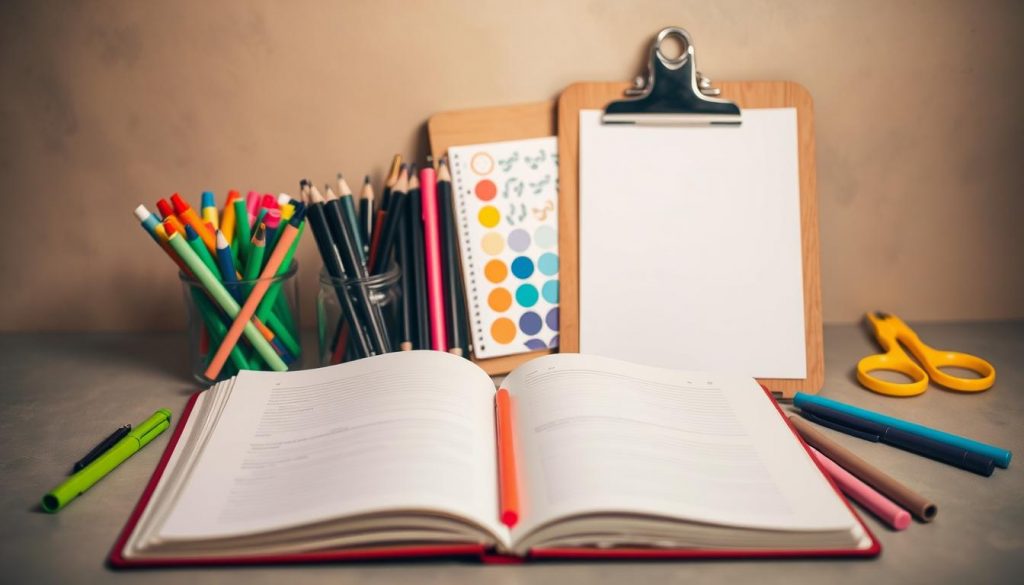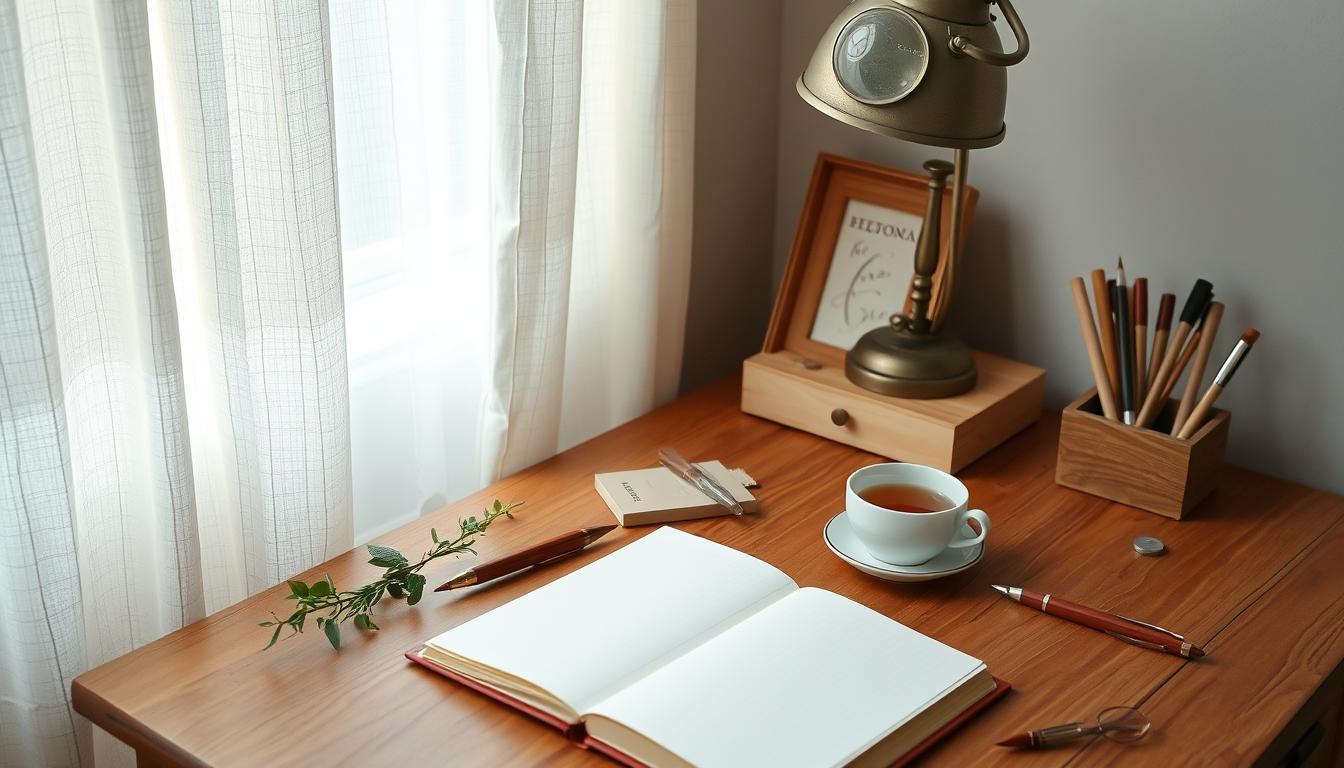Journaling isn’t about being perfect. It’s about connecting with yourself and your feelings. When I started, I worried about making mistakes. But, there’s no such thing as a wrong entry in your journal.
Journaling isn’t hard. It’s just talking to yourself. Think of it as a safe place where your thoughts can be free. That’s what it means to start journaling.
Writing by hand is different from typing. It makes your brain work better and helps organize your thoughts. Just one notebook and 15 minutes a day can change your mind.
Your journal is a personal safe space. You don’t need fancy things or to be artistic. All you need is curiosity and a pen. It can help you track your day, deal with feelings, or set goals.
Are you ready to start this amazing journey of self-discovery? Let’s explore journaling together. Your only rule is to be yourself.
Understanding the Basics of Journaling for Dummies
Journaling is more than just writing in a notebook. It’s a powerful tool for personal growth and self-discovery. Imagine having a trusted friend who listens without judgment—that’s exactly what your journal becomes.
What Exactly is Journaling?
At its core, journaling is a personal writing practice. You document thoughts, feelings, experiences, and reflections. It’s a versatile technique that adapts to your unique needs and style. Whether you’re tracking daily events or exploring deep emotions, there are no strict rules.
Why Start a Journal Now
The journaling benefits are remarkable and backed by solid research. Consider these compelling statistics:
- 70% of individuals report reduced anxiety through regular journaling
- 93% find journaling aids in self-reflection
- 82% improve problem-solving skills
- 50% experience a significant boost in creativity
“Journaling is a conversation with yourself on paper” – Unknown
Breaking Down Common Misconceptions
Many people hesitate to start journaling due to myths. Let’s debunk them with some journaling ideas:
| Myth | Reality |
|---|---|
| You must be a great writer | Journaling is about expressing yourself, not winning writing awards |
| Journals must be perfectly organized | Your journal can be messy, spontaneous, and uniquely yours |
| You need special skills | Anyone can journal—no special talents required |
Remember, your journal is a judgment-free zone designed exclusively for you.
The Remarkable Benefits of Daily Journaling Practice
Journaling can change your life in amazing ways. It’s not just writing; it’s a tool for growing and staying mentally healthy.
“Writing is a form of therapy; sometimes I wonder how all those who do not write, compose, or paint can manage to escape the madness, melancholia, the panic and fear which is inherent in a human situation.” – Graham Greene
A study by Stice, Burton, Bearman, & Rohde in 2006 found journaling’s power. It showed journaling can be as good as therapy in fighting depression in young adults.
- Journaling for mental health offers many benefits:
- It reduces stress and anxiety
- It helps manage emotions
- It boosts self-awareness
- It improves how we process information
For those looking to boost creativity, journaling is perfect. It’s a place where you can freely explore ideas and tap into your creativity. Neurologist Judy Willis says writing makes our brains better at learning and remembering.
| Journaling Benefit | Measurable Impact |
|---|---|
| Stress Reduction | 60% reduction in stress levels |
| Goal Achievement | 25% increase in personal goal tracking |
| Self-Awareness | 40% improvement in self-reflection |
Just 20 minutes of journaling 3-5 times a week can lead to big health gains. People in studies had fewer doctor visits for stress, better immune systems, and felt better overall.
Your journal is a powerful tool for change. It helps you face life’s challenges with more clarity and emotional smarts.
Essential Tools and Supplies to Begin Your Journey
Starting your journaling journey doesn’t need to cost a lot. With the right tools, you can turn simple writing into a powerful way to learn about yourself. Let’s look at the key supplies that will make your journaling fun and meaningful.
Choosing Your Perfect Journal
Finding the right journal is key for your writing. Nearly 50% of millennials have started journaling again, and you can too! Think about these things when picking your journal:
- Paper quality (recommended 80-160 GSM)
- Size and portability
- Binding style
- Page type (dot grid, lined, blank)

Must-Have Writing Tools
Your writing tools can really improve your journaling. Here are some top picks for easy journaling tips:
| Tool | Price | Best For |
|---|---|---|
| Sakura Pigma Micron Pens | $11.99 (6-pack) | Precise writing |
| Pilot Dr. Grip Pen | $5-$8 | Comfortable grip |
| Correction Tape | $3-$5 | Clean corrections |
Optional Creative Supplies
If you want to add some creativity to your journal, consider these optional supplies:
- Colored markers
- Washi tape
- Stickers
- Small ruler for neat layouts
Remember, the most important tool is your commitment to regular writing. Start simple and enjoy the process!
With these basic prompts and supplies, you’re all set to start your journaling journey. You can start for as little as $30, making it both affordable and rewarding.
Simple Writing Techniques for Beginners
Starting your daily writing practice might seem scary, but it’s not. Journaling is for everyone, no matter your skill level. It’s perfect for those just beginning with their first journal.

- Free Writing: Write without stopping, filtering, or judging your thoughts
- Morning Pages: Three pages of stream-of-consciousness writing first thing in the morning
- Prompt-Based Journaling: Use guided questions to inspire your writing
- Gratitude Journaling: Record things you’re thankful for each day
“Writing is a form of therapy; sometimes I wonder how all those who do not write, compose, or paint can manage to escape the madness, melancholia, the panic and fear which is inherent in a human situation.” – Graham Greene
Studies show journaling can really help your mental health. A 2021 survey found 75% of people said journaling helped them feel clearer and more focused.
| Technique | Time Commitment | Benefits |
|---|---|---|
| Morning Pages | 15-20 minutes | Clears mental clutter, boosts creativity |
| Gratitude Journaling | 5-10 minutes | Reduces stress, improves mood by 30-50% |
| Free Writing | 10-15 minutes | Overcomes writer’s block, enhances self-expression |
There’s no one right way to journal. The most important thing is to find a method that feels right to you. Make it a regular part of your life.
Creating Your Personal Journaling Routine

Starting a regular journaling routine can turn writing into a powerful tool for growth. The way you set up your journal can make all the difference. It can turn a short-term hobby into a lifelong habit.
Finding Your Ideal Writing Time
Finding the best time to journal is key to building good writing habits. Studies show that most people prefer to journal in the morning or evening. Here are some good times to consider:
- Early morning with your first cup of coffee
- Right before bedtime for reflection
- During a lunch break for midday processing
- Immediately after work to decompress
Setting Up Your Writing Space
The setup of your journaling space greatly affects your commitment. Over 50% of journal users say that attractive materials motivate them. Make a space that inspires you:
| Space Element | Recommended Setup |
|---|---|
| Lighting | Natural light or soft, warm illumination |
| Comfort | Quiet area with comfortable seating |
| Tools | Quality journal, preferred writing instruments |
Building Consistent Habits
Being consistent is essential for journaling habits. Research shows that 10-15 minutes a day can make you more likely to keep going by 40%. Here are some tips:
- Set a specific daily time
- Start with short, achievable writing sessions
- Track your progress
- Be kind to yourself if you miss a day
“Journaling is like whispering to one’s self and listening at the same time.” – Mina Murray
Remember, your journaling routine should be enjoyable. Experiment until you find what works best for you. Make writing a cherished part of your daily life.
Popular Journaling Styles and Methods
Explore the many journaling styles that can change your life. Bullet journaling, started in 2013, is great for keeping track of tasks and thoughts. It’s perfect for those who want to stay organized and creative.
Gratitude journaling is a powerful way to feel better. Just write down three things you’re thankful for each day. It can make you happier and less stressed. Simple things like a good cup of coffee or a friend’s smile can make a big difference.
There are many journaling styles to try. Dream journals record your dreams, while art journals let you express yourself through art. Journaling is all about finding what works for you and having fun with it.
Whether you like bullet journaling or just writing, there’s a method for you. Start with a few pages a day and try different prompts. Find what makes you happy and keeps you coming back for more.
FAQ
Do I need to be a good writer to start journaling?
No, you don’t need to be a great writer to start journaling. Your journal is for your eyes only. So, don’t worry about making mistakes or writing perfectly. Just write whatever comes to mind.
How often should I journal?
There’s no set rule for how often to journal. Some journal every day, while others do it a few times a week. What’s important is finding a routine that works for you. Start with what feels right, even if it’s just a few minutes a few times a week.
What should I write about in my journal?
Write about anything you like! You can jot down your thoughts, feelings, daily experiences, goals, dreams, challenges, or things you’re grateful for. If you’re stuck, try prompts like “Today I felt…”, “I’m grateful for…”, or “My biggest challenge right now is…”
Do I need a fancy journal to get started?
No, you don’t need a fancy journal to start. You can use any notebook, a simple composition book, or even digital journaling apps. The most important thing is to start writing, not to have the perfect journal. Choose something that feels inviting to you.
How long should my journal entries be?
There’s no set length for your journal entries. They can be short or long, depending on what feels right to you. The goal is to express yourself freely, not to meet a word count.
Is it okay to skip days in my journaling practice?
Yes, it’s okay to skip days if you need to. Journaling should be a supportive practice, not a strict rule. Just pick up where you left off when you’re ready.
Can journaling really help with mental health?
Yes, research shows journaling can help with stress, emotions, and self-awareness. It can reduce anxiety, improve mood, and offer a healthy way to express feelings.
Should I keep my journal private?
Your journal is a personal space, and you decide who sees it. Many people keep their journals private to write freely and honestly without fear of judgment.
What’s the difference between journaling and keeping a diary?
Journaling is more flexible and introspective than keeping a diary. A diary often records daily events, while journaling includes emotional processing, goal setting, creative writing, and personal reflection.
Can I use digital tools for journaling?
Yes, you can use digital tools for journaling. Digital journaling apps and tools are popular for their convenience, privacy, and features like password protection and easy searching.
Source Links
- How to Bullet Journal: The Absolute Ultimate Guide — The Lazy Genius
- Bullet Journaling for Beginners (and Impatient, Unartistic People Like Me)
- How to Start a Bullet Journal for Beginners
- Journaling for Beginners: How to Get Started in 10 Steps
- How to Start and Keep a Journal
- Top Evidence-Based Benefits of Journaling for Mental Health | Online Journal and App by Reflection.app
- Journey.Cloud – Free Online Journal & Diary
- Journal Writing: A Step-By-Step Guide for Beginners
- 9 Essential Tools for Beginner Journalers – Longhand Collective
- 5 Essential Bullet Journal Supplies For Beginners
- How To Start A Journal: The Ultimate Guide For Beginners – She Dreams All Day
- A Beginner’s Guide to Keeping a Journal
- A Beginner’s Guide To Journaling & Writing Daily Diary Entries
- Journaling Tips for Beginners to Encourage a Meaningful Life
- A 5-Minute Daily Journaling Routine for Higher Focus and Clarity — OMAR ITANI
- Journaling For Dummies Cheat Sheet
- The Lazy Guide to Journaling in 10 Minutes or Less

